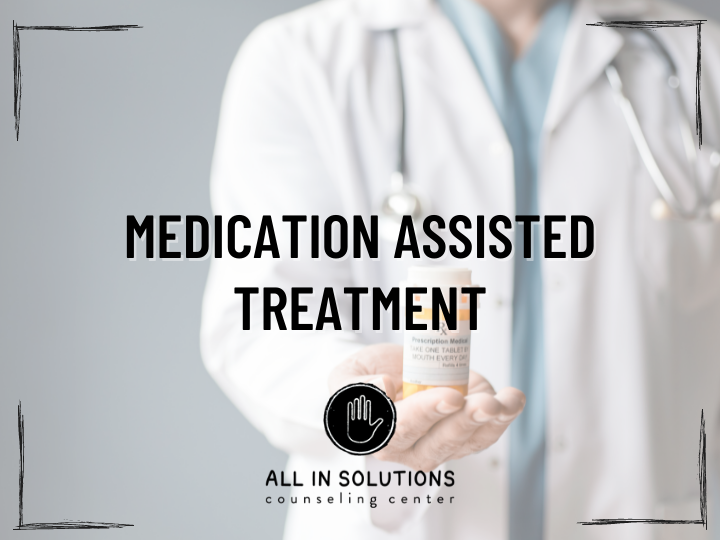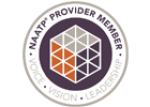Medication Assisted Treatment
MAT – Medication-Assisted Treatment –
Medication-Assisted Treatment, also known as MAT, uses medications such as Suboxone, Vivitrol, and Methadone. This type of program continues to be highly successful and one of the most necessary treatments for specific individuals suffering from opioid, alcohol, or widespread substance abuse.
MAT has helped save millions of lives throughout the entire U.S that struggle with the consequences of opioids, alcohol, and substance abuse. Heroin, fentanyl, hydrocodone, oxycodone, morphine, codeine, and oxymorphone are the most commonly abused opioids. These substances are highly addictive and have dangerous side effects. MAT is a known supplement to overcoming this abuse.
All In Solutions provides an individualized and patient-centered MAT program to help expedite the recovery process and commonly assist in the early stages of recovery. However, some addicts and alcoholics may continue using MAT moving forward as an ongoing supplement to long-term success in sobriety.
What Is Medication-Assisted Treatment (MAT)?
SAMHSA defines Medication-Assisted Treatment as “the use of FDA-approved medications, in combination with counseling and behavioral therapies, to provide a holistic approach to the treatment of substance abuse disorders.”
See below for a range of medications commonly prescribed in MAT- These medications are all FDA Approved-
FDA-approved medications include-
• Vivitrol
• Suboxone
• Methadone
Medications such as these help with withdrawal symptoms as well as cravings.
All In Solutions believes in supplementing the medication program by encouraging patients to engage in individual and family counseling, 12 Step Meetings, Faith-Based Recovery, and a wide variety of additional treatment benefactors to help maintain level ground within their sobriety.
Learn more about All In Solutions Medication-Assisted Treatmentby giving us a call today.
More Information: Most Common Types of Medication Used in MAT
The FDA-approved medications are prescribed and distributed by nurses who fully understand addiction’s complexity and medical sides.
Here is how these particular medications work for patients:
Suboxone Treatment (Buprenorphine)
While Methadone is a full agonist, the FDA-approved Suboxone (buprenorphine) is a partial agonist used during Medication-Assisted Treatment. This means it does not bind fully to opioid receptors like Methadone.
Comprised buprenorphine and naloxone, Suboxone effectively treats opioid withdrawal as it alleviates the physical symptoms and decreases cravings for continued opioid use. If an individual attempts to abuse opioids—such as heroin and prescription painkillers—while taking Suboxone, that person will experience adverse results because naloxone counteracts the effects that opioids have on the brain.
Vivitrol Treatment
This FDA-approved injectable medication is an antagonist designed to avert cravings for an extended amount of time. Administered only once each month during a Medication-Assisted Treatment program, this naltrexone-based medication wards off opioid cravings, alleviate physical symptoms of withdrawal, and prevents overdose from occurring.
Vivitrol requires the user to abstain from any opiate for 14 days before the first injection.
Methadone Treatment
Methadone is one of the oldest medications regarding MAT and is also the most potent. Methadone is considered a full agonist, which lessens the withdrawal symptoms and blocks any euphoric effect a taking an opiate could produce. Methadone is a highly regulated drug and is normally administered once a day. Methadone can be effective; however, it is also highly addictive if abused.
Is MAT an effective program for Alcohol/Opioid/Substance Abuse Addiction?
While addiction affects everyone differently, Medication-Assisted Treatment has proven to be an effective method in combating the disease throughout the recovery process.
Clinical Research has shown that Medication-Assisted Treatment helps patients adhere to the recovery process and reduces opioid abuse compared with other non-medicated approaches.
These medications directly affect the impact the opioid receptors have on the brain. Therefore, medicines of this sort not only lessen opioid cravings but they help patients with the physical, mental, and emotional symptoms that occur during withdrawal.
Medication-Assisted Treatment helps alleviate withdrawal symptoms, including:
|
|
|
|
|
|
|
|
|
|
|
|
Another aspect of what makes Medication-Assisted Treatments compelling is the professionals’ support and education at outpatient clinics.
All In Solutions prides itself on a high-quality and holistic approach to care, including medication maintenance programs and detoxification, medical examinations, HIV, Hepatitis, Tuberculosis, and urinalysis testing.
All In Solutions provides individual and group substance abuse counseling, family counseling, on-site 12-step meetings, and community-based resources for vocational and educational assistance.
Medication-Assisted Treatment programs focus on the individual’s needs. Still, they also create a foundation and system of support from staff, peers, friends, and family to help patients achieve their lifelong recovery goals.
Common Myths Surrounding MAT-
Despite the ongoing evidence that Medication-Assisted Treatment is an effective method for treating opioid addiction, there are still stigmas and myths from policymakers and the public surrounding the treatment.
Many people frown upon MAT or judge a person’s on a MAT program; however, this clinical and medical approach is highly effective and has produced significant positive recovery outcomes.
Alcoholics and addicts should never be steered away from Medication-Assisted-Treatment unless advised by a medical professional otherwise on an individual case basis. This program has been a critical piece in fighting the opioid epidemic in today’s world and is a huge support to those suffering from alcoholism.
MAT Is NOT Just A Short Term Solution…
Medication-Assisted Treatment requires action just like any other rehabilitation program. One’s successful journey in recovery also relies on the work the individual puts into themselves and the direction from clinical and medical professionals in staying on the path with their treatment plan. With trained medical staff and a patient fully adhering to the individualized clinical plan, one should be on a successful approach to long-term sobriety.
MAT DOES NOT Disrupt the Recovery Process
Medication-Assisted Treatment can be vital and is a crucial part of the recovery process for many addicts and alcoholics. MAT should never be thought of as a disruption to the recovery process as long as the client at hand is adhering to medically provided principles and practices.
Most Insurance Plans CAN Cover MAT
All In Solutions provides affordable medical treatment and care that is accepted by most insurance plans.
Suboxone is a self-administered medication designed to diminish symptoms of opioid withdrawal, reduce cravings, and block the effects of other opioids. Suboxone contains both buprenorphine and naloxone.
Buprenorphine is an opioid with minimal effects than other controlled or illicit substances but can be used in patients to treat chronic pain.
Naloxone is an opioid antagonist. When injected, naloxone can immediately cause a long-term opioid user to go into withdrawal. This will deter the patient from misusing or diverting Suboxone while in treatment or after completion of therapy.
An initial pre-assessment will be done over the phone to determine the appropriate level of care before admission.
Once the pre-assessment is complete, an intake appointment will be scheduled as well as transportation if needed.
The intake process will include various assessments and screenings, including a bio/psycho/social assessment, trauma screening, medical evaluation, lab work, and a clinical intake.
We take a multifaceted approach to the assessment process to create the most comprehensive and individualized treatment plan per the individual.
Within the first week, our clinical team will obtain all necessary background information, history of substance use, past and present mental health diagnosis, legal status, family/marital status, and more.
Our psychiatrist will medically evaluate clients to update and manage each client’s medication profile. Case management will create a vocational and professional development plan, including resume building, job placement and interviews, and continuing education.
Each client will attend weekly or even biweekly one-on-one therapy sessions with their primary therapist upon admission into the program until completion. Many will continue individual counseling on a general outpatient level of care indefinitely.
Clients will attend group counseling sessions with their peers daily. Each clinical group is focused on one or more topics specific to evidence-based therapeutic modalities proven to treat substance use disorder and a variety of co-occurring mental health disorders.
Group sessions help decrease one’s feeling of isolation in treatment and provide peer support throughout the process. Each group is led by a licensed/master’s level clinician or group facilitator, allowing clients to discuss and process different topics openly.
The Case Management process provides various professional, legal, social, and vocational support services to those in treatment.
Each client will work with their case manager to develop an individualized aftercare plan focused on maintaining a positive and productive recovery network, housing, clinical support, and professional assistance.
Intensive Outpatient or IOP involves a gradual step-down process to prepare clients for their everyday life while still receiving a high level of clinical support.
IOP starts at 6-days per week, including 3 hours of daily group counseling, individual counseling, and psychiatry/medical appointments. Clients will gradually drop one day per week as deemed appropriate by their primary therapist. By the time the individual is attending a 3-day IOP, they will be working, in school, or volunteering to make productive use of their downtime. The remaining clinical sessions are used to process and support clients in their continued recovery while dealing with other professional and/or social stressors/triggers.
Individuals will be evaluated by a licensed psychiatrist and/or licensed medical professional. The practitioner will do an ASAM evaluation to diagnose the patient properly.
Patients will receive continued medical/psychiatric services throughout the program to properly treat any post-acute symptoms, medication management, and continued mental health diagnosis.
Detoxification also known as Detox, is an is an inpatient/medically monitored process in which the individual is gradually and sustainably titrated off drugs and/or alcohol. Patients are given the appropriate dosages of comfort medications to reduce all physical and psychological symptoms of withdrawal.
Medication-Assisted Treatment is complete once the patient is clear of acute withdrawal symptoms. However, some individuals based on medical recommendations can be advised to use ongoing maintenance methods.
Questions about starting treatment?





